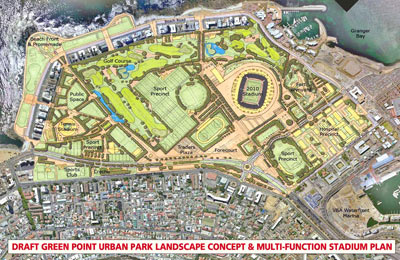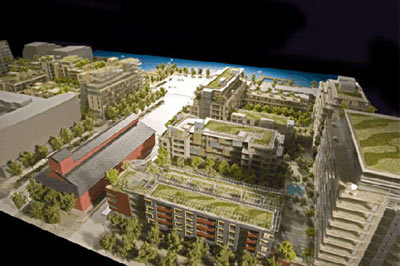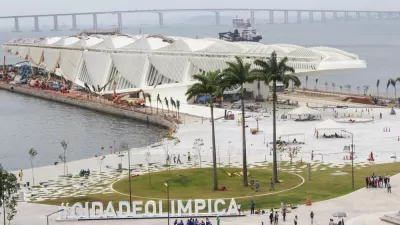Whether you've realized it yet or not, soccer is a big deal in this gloabalizing world. And every four years it's a huge deal for one country: the host of the FIFA World Cup. All eyes are on the host country for the 32-team tournament, which is the most-watched sporting event in the world. And though showtime is just one month long, the host spends years vying, preparing and investing for the tournament. It has major potential to spur broad countrywide improvements and economic development. So when the U.S. made news recently by offering forth 70 stadia as possible host sites for either the 2018 or 2022 World Cup (along with a reputation booster from President Barack Obama), I had to filter out my national pride. Sure, the U.S. would make a good and clearly able host for the event, but it seems that the potential of the World Cup could be better directed towards a country that really needs large-scale civic improvement and investment.
Whether you've realized it yet or not, soccer is a big deal in this gloabalizing world. And every four years it's a huge deal for one country: the host of the FIFA World Cup. All eyes are on the host country for the 32-team tournament, which is the most-watched sporting event in the world. And though showtime is just one month long, the host spends years vying, preparing and investing for the tournament. It has major potential to spur broad countrywide improvements and economic development. So when the U.S. made news recently by offering forth 70 stadia as possible host sites for either the 2018 or 2022 World Cup (along with a reputation booster from President Barack Obama), I had to filter out my national pride. Sure, the U.S. would make a good and clearly able host for the event, but it seems that the potential of the World Cup could be better directed towards a country that really needs large-scale civic improvement and investment.
Next year, for the first time, the World Cup will take place in an African nation. South Africa is currently preparing to host the event by constructing five new stadia, updating international airports, expanding road systems, improving inter-city connectivity and building entirely new inner-city transit systems. Though South Africa is the most developed country on the continent, by global standards it is still developing. The World Cup is an incredible opportunity for South Africa and many there have high hopes that the Cup will bring not only a boost to its global reputation, but also built and economic improvements that last long after the crowds have left. Brazil has been chosen as the host for the next World Cup, to be held in 2014. As another relatively developing country, the opportunities and challenges are almost identical. Both South Africa and Brazil struggle with crime, poverty, disease and economies that seem stuck on the top of the third world, just out of reach of the economic north. The World Cup may just be the opportunity each of these countries need.
The opportunity is similar to that offered by the Olympics, but definitely not the same. The global spectacle of the Olympics results in billions of dollars in investment for individual cities to host the roughly three-week event. In the same way that countries bend over backwards to earn the right to play host of the World Cup, claiming the Olympics is like a beauty pageant for cities. Convincing the International Olympic Committee that a city is going to be a good host requires a lot of preening, boasting and promises. (The rules guiding the bids for these events could probably do a great deal more to encourage better cities or countries, but that's a whole other matter that I'll be getting into another time.) Richer cities tend to make better bids and promises, and are often chosen as hosts.
Maybe this makes sense. A spectacle like the Olympics -- with its speed-skating, pole-vaulting, velodromes and curling -- kind of belongs in already wealthy cities, mainly because they're much more likely to be able to sustain over the long-run the sort of niche construction the event requires. (Yeah, there are some examples that prove exactly the opposite, Athens most notably, but host cities seem to be learning.) Detroit, for example, is almost certainly a bad place to hold the Olympics. But does prospective 2016 Olympics host Chicago really need a huge influx of civic investment? Or 2012 host London for that matter? In the global scheme of things, these are already wealthy cities. And while every city could use a little more investment, these places aren't struggling to stay alive -- not like Detroit anyway. What wealthy cities are good at, however, is proving ideas -- ideas which can then be emulated by other places.
Because the Olympics is essentially a city event, its related preparations have the opportunity to bring about specific and innovative improvements to city form and function. London, for example, is planning to redevelop its Olympic Village athlete housing complex as a mixed use, mixed affordability housing and retail development after the games are over. 2010 Winter Olympics host Vancouver has some similarly progressive plans for its own Olympic Village, 50% of which will be covered with green roofs. Beijing's infamously smoggy skies were impressively cleared during the 2008 Olympics when the city instituted strict limitations on car usage -- and a slightly watered-down version of those rules was recently extended for another year. These sorts of ideas are great for cities. But they're rainbow sprinkles, as opposed to the plain vanilla infrastructure improvements that a World Cup requires on a countrywide scale. If a country doesn't have that ice cream in its bowl, what good are the sprinkles?
It probably makes more sense for developing countries to host a countrywide event like the World Cup. As opposed to taking place in already developed countries, the event would have a much more significant potential and effect in a developing country -- bringing a distinct reason for things like transportation system improvements, airport upgrades and more carefully considered local business models.
Like the Olympics, hosting the World Cup is by no means a ticket to prosperity. But it does offer a chance -- and a definitive time frame -- to bring about broad changes to the host country. That's an opportunity the U.S. doesn't really need, at least when compared to the developing countries of the world. Among the other 10 bids for the 2018 and 2022 World Cups, Indonesia stands to benefit the most from hosting the event, mostly because it is least prepared. But that's exactly why it won't be chosen for either year's event and why the U.S. probably will.

Maui's Vacation Rental Debate Turns Ugly
Verbal attacks, misinformation campaigns and fistfights plague a high-stakes debate to convert thousands of vacation rentals into long-term housing.

Planetizen Federal Action Tracker
A weekly monitor of how Trump’s orders and actions are impacting planners and planning in America.

In Urban Planning, AI Prompting Could be the New Design Thinking
Creativity has long been key to great urban design. What if we see AI as our new creative partner?

King County Supportive Housing Program Offers Hope for Unhoused Residents
The county is taking a ‘Housing First’ approach that prioritizes getting people into housing, then offering wraparound supportive services.

Researchers Use AI to Get Clearer Picture of US Housing
Analysts are using artificial intelligence to supercharge their research by allowing them to comb through data faster. Though these AI tools can be error prone, they save time and housing researchers are optimistic about the future.

Making Shared Micromobility More Inclusive
Cities and shared mobility system operators can do more to include people with disabilities in planning and operations, per a new report.
Urban Design for Planners 1: Software Tools
This six-course series explores essential urban design concepts using open source software and equips planners with the tools they need to participate fully in the urban design process.
Planning for Universal Design
Learn the tools for implementing Universal Design in planning regulations.
planning NEXT
Appalachian Highlands Housing Partners
Mpact (founded as Rail~Volution)
City of Camden Redevelopment Agency
City of Astoria
City of Portland
City of Laramie





























